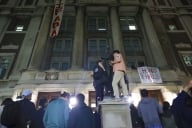You have /5 articles left.
Sign up for a free account or log in.
My father, may he rest in peace, often said “Never volunteer.” His caveat: “Except when it’s your duty.” So, in 2008 I volunteered to chair a search committee for the City College of the City University of New York’s philosophy department. It began as a duty, but quickly snowballed into a challenge and, apparently, into a saga that has both a happy and a sad ending.
In early autumn 2008, we began to advertise the assistant professor, tenure-track position. Our department is small, with just six full-time members and a dozen or so adjuncts. However, it is versatile and we cover quite a few philosophical bases. Because of this, we sought to hire as promising a young philosopher as we could find, instead of seeking expertise in a predetermined area of specialization (e.g. logic or ethics or philosophy of X-ology). We designated the area of specialization and areas of competence – essential components of philosophy ads – as “Open.”
This broadening tactic invariably attracts more – rather than fewer – applicants. We expected to receive between 200 - 250 applications by the December 1 deadline. To our surprise, packages began to arrive in droves, and eventually in wheelbarrow-loads from the mailroom. In all, we received submissions from 637 candidates.
As each complete application contained a cover letter, CV, letters of recommendation, teaching portfolio and writing sample, the number of storage boxes required to contain them all gradually swelled to more than 30, stacked five or six high against a wall.
This posed a major filing challenge since less well-organized applicants sent in their materials in dribs and drabs. Hundreds of letters of recommendation not bundled with applications had to be opened, tallied and filed. At times, six boxes had to be displaced to file one piece of paper. It became a common sight to behold members of our search committee trundling half a dozen boxes to their offices on handcarts so they could keep up with the incoming deluge.
My own workflow entailed opening every package and letter and updating an Excel spreadsheet with the name and e-mail address of each applicant, date the application was received, status of application (complete or missing components) and date(s) of emails sent to applicants acknowledging receipt, completeness and so forth.
On the soft copy front, I received and responded to dozens of e-mails from applicants and prospective applicants who managed to ask every conceivable (and quite a few inconceivable) questions. One FAQ involved timing: We required the Ph.D. in-hand by September 2009 (as stated in our job ad), but many prospective applicants asked if that date could be deferred. It could not. Some applicants submitted as many as five writing samples (we requested one), and asked if we could read them all and select "the best." We could not. Oddly if truly, some European applicants claimed it was impossible to solicit three letters of recommendation (as we requested) from European professors, and asked if we could make do with just one. We could not. The most forlorn hopes: Some applicants held Ph.D.'s in fields other than philosophy, but asked to be considered for the position in any case. Their chances were slim-to-none. Needless to say, this “bookkeeping” process, along with a rash of "pen pals," occupied quite a few evenings and weekends.
Beyond that, each of the five committee members – three philosophers and two historians – devoted considerable hours to reading the CVs, recommendations and, most importantly, the writing samples – mainly published papers, book chapters or works in progress. While the sheer volume of reading deprived us of the leisure to contemplate each and every writing sample as deeply as we might have liked, overall we got a very good sense of what the next generation of philosophers is up to.
The committee’s next task was to compile a “long list” of applicants to interview at the upcoming American Philosophical Association (APA) Eastern Division annual meeting. We had less than four weeks to identify and notify the candidates we wanted to meet with in time for the event, held December 27–30 in Philadelphia.
This gathering, known somewhat sardonically as the “meat market,” is where most preliminary interviews are held. Picture a hotel ballroom filled with dozens of numbered tables. Around each table sits a subcommittee of philosophers from a given institution waiting to meet with their “long list” of candidates.
From 9 a.m. to 5 p.m. each day a veritable river of candidates flows into this daunting arena. Interviews last 30 minutes to an hour, and each candidate knows that he or she has a brief opportunity to impress the interviewers sufficiently to make the “short list” and be invited to campus for the final competition. Three of our five committee members attended the 2008 APA meeting to meet with our long list of 27 candidates: 19 interviewees and 8 “stand-bys.” The stand-bys had agreed to be on call, just in case any of the 19 interviewees canceled or failed to show up. In fact, all 19 appeared as scheduled.
How did we prune our field from 637 to 27? An important selection criterion was holding a Ph.D. from a good university. Members of our department earned their Ph.D.s at Columbia, Harvard, Oxford, and University of London. Additionally, City College is known as the “Harvard of the Proletariat,” with distinguished alumni that include nine Nobel Laureates, more than any other public institution in America. Our faculty members are expected to live up to this legacy.
A second criterion was research and publication. We looked not only for quality and promise of quantity, but also for originality. Creativity and individuality are assets for philosophers. We did not want candidates who merely parroted back what they had been taught at graduate school.
Third, we needed evidence of undergraduate teaching ability as well as versatility. We offer a broad range of electives to a diverse student body; a narrow focus does not serve our pedagogic needs well. Most applicants submitted extensive teaching portfolios including syllabuses, reading lists, student evaluations, and observations by senior professors. We looked for evidence of outstanding teaching ability, variety, and potential for curriculum development.
Finally, we wanted evidence of administrative service. Ideally, the candidate would also possess some ability to raise research funds, although this is not too prevalent among philosophers. Even so, a good many applicants had raised funds: either minimally in the form of postdoctoral fellowships, more broadly for organizing conferences, or most notably for research projects (either solo or collaborative).
Without collusion, each search committee member drew up a list of two to three dozen top picks. Then we met and compared notes. Because the committee members had wide-ranging expertise, we expected and realized a fairly broad dispersion of preferences during our initial screening. Such dispersion was desirable, since it decreased the likelihood that any truly worthy candidate would escape notice.
As it happened, the committee discovered significant overlap of preference for 27 applicants, 19 of them in particular. We resolved to interview these candidates in Philadelphia and arranged half-hour meetings with them over two consecutive days.
Most of the candidates we interviewed were quite impressive; only a few appeared better on paper than in the flesh. By the same token, we probably failed to long-list some exemplary applicants who had appeared less impressive on paper. No net catches every fish.
We attained consensus on six finalists whom we invited to campus in February 2009. They ran a gauntlet of meetings, and each one had to give a “guest lecture” for an undergraduate course in progress – as opposed to reading a paper in a departmental colloquium. We knew they could all read and write well enough, or they wouldn’t have been finalists.
Now we had to find out whether they could teach at CCNY, where we have students from 150 countries, immersed moreover in the ethos of the Big Apple. New York City can be an attractive place for aspiring young philosophers, but it’s a complex and challenging megalopolis, not particularly well suited to the faint-hearted, mild-mannered, thin-skinned or weak-willed. CCNY's student body is older and more diverse than average; juggles academic, familial and bread-winning roles more than average, and is far more "street-wise" than average. Manhattan has celebrities, egomaniacs and con artists on every corner; professors need some "personality" to compete for students' attentions.
On top of this, American education is affected by two significant trends: First, as of this year, and unprecedented in human history, more than half the world's people live in cities; second, America’s indigenous youth are increasingly post-literate, having been acculturated predominantly via visual and digital traditions that have supplanted the written one.
So we parachuted our six finalists into classrooms, having afforded them prep time and topics for their various guest-lectures. The search committee sat in of course, inscrutably observing the proceedings.
All the finalists were impeccably well versed in their subjects matter, but not all succeeded in establishing rapport with the students. One lectured remotely, as if from afar; another failed to engage them in dialogue; a third took insufficient account of whether the class was grasping the material.
Some lectured clearly and evocatively, encouraged and fielded questions on the fly, bridged gaps in students' understanding by providing additional context where necessary, and covered the material in the allotted time. The best finalists attracted a throng of students after the lecture, having whetted appetites for further learning. The top two bundled humor with their lectures or slides, which palpably enhanced the ambiance and helped establish rapport. "Edutainment" is an American neologism, after all.
As our dean of humanities, Fred Reynolds, began to meet the finalists, he seemed increasingly impressed with them. He asked me jocularly “However are you going to choose the best among them?” I replied that he could greatly simplify our task by hiring them all.
In any event, we achieved consensus in ranking our six finalists. While they had all interviewed brilliantly in Philadelphia, the “acid test” of the campus visit in some cases corroded their luster in the classroom or revealed mismatches with our student-body or institutional culture. Other finalists rose to the occasion, performing convincingly if not flawlessly.
A question we asked each of them pertained to CCNY itself: “What do you know about City College’s history and mission?” Any finalist worth his or her salt does some research on the institution (and its faculty) that invites them to campus. Some of our finalists had anticipated this question and were well prepared to answer it. This certainly counted in their favor. Also important were the kinds of questions they asked us. For example, only one finalist inquired whether we had an undergraduate philosophy club. This, among other things, raised his standing.
Not long after handing our final rankings to Dean Reynolds, he called me into his office. He informed me that the abundant fruits of our search, and the energy we had invested in it, had not escaped the notice of our senior administration. Prudentially, I recalled the second of three infamous Chinese curses: “May the government be aware of you.” But this time it was a blessing.
Dean Reynolds and Provost Zeev Dagan, alike, perceived this search as a unique opportunity to strengthen our department and the college with the pick of a bumper crop of promising young philosophers. The dean had obtained the provost’s approval and the support of President Gregory H. Williams to hire not one, but two of our finalists.
So this part of the saga has a happy ending, indeed, because our top two finalists both accepted offers and will be joining us this September 2009. They are Darren Bradley, and Christy Mag Uidhir. Darren earned a B.Sc. at the London School of Economics and Political Science, an M.A. at University College London, and a Ph.D. at Stanford University. His specialties include epistemology and philosophy of language; competencies, philosophy of science, and of mind. Christy earned a B.A. at Texas Christian University, an M.A. at Brown University, and a Ph.D. at Rutgers University. His specialties include philosophy of art and aesthetics; competencies, metaphysics and ethics. We welcome them warmly.
In retrospect, it is clear that the success of our search depended vitally on three factors. First, there was a tremendous talent pool from which to draw. Given sufficient time and resources, we would have interviewed our entire long list of 27.
Second, our search committee was a paragon of industry and cooperativeness, completely unsaddled with the kinds of unprofessional baggage that so often results in dysfunction and counter-productivity in academic settings. Philosophers Jeff Blustein and Michael Levin, and historians Danian Hu and Darren Staloff, worked diligently and well together, making the process enjoyable rather than merely dutiful.
Third, we were beneficiaries of an enlightened administration that is committed to the humanities, which approved and funded the search and did not blink in the face of the economic crunch. Rather, it seized an opportunity to hire two outstanding prospects instead of only one.
I close with two observations: one personal; the other professional. Personally, this process brought me “full circle.” I had gone through it as a candidate during 1993-4, and won the competition, albeit with fewer competitors, that landed me at CCNY. Chairing this search in 2008-9 not only reminded me of the inexorable turning of time’s wheel, but granted me fulfillment by being able to facilitate for others a process from which I had derived immeasurable benefit. It was a kind of payback to my colleagues, my department and the college.
Second and professionally speaking: Although we were privileged to obtain two hires, I feel a deep and abiding sorrow that so many dozens – indeed, hundreds – of talented and promising young philosophers will not be hired by anyone.
Philosophy remains arguably the most difficult and demanding subject in the humanities. It develops and hones intellectual, critical and analytical skills, partly for their own sakes and partly for application to wide-ranging matters.
While philosophy is an excellent component of preparation for a variety of non-philosophical careers – from law to medicine, from journalism to international affairs – philosophy also has intrinsic as well as instrumental values that are, at present, grossly underutilized by our society and unrecognized by far too many philosophy departments themselves.
Many of our finest young minds are being educated by departments and institutions whose myopic “vision” of philosophy limits young philosophers to becoming permanently institutionalized in the academy . They are insufficiently versed in the myriad ways in which philosophy can be usefully applied outside the groves of academe.
Universities educate and graduate professionals of every conceivable kind, who render invaluable professional services outside the academy – with the noteworthy exception of philosophers. The American Philosophical Practitioners Association (APPA), which I co-founded in 1999, is working to remedy that exception. It trains and certifies philosophers to render professional services to individuals, groups and organizations worldwide. APPA’s mission is to see many more of our brightest young minds pursuing professional careers as philosophers, both inside and outside academe. And it is my unwavering aspiration to see our society and culture benefit from having many more philosophers working productively and far fewer languishing wastefully.








